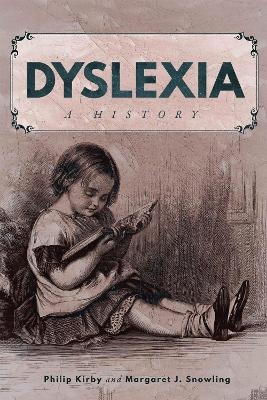
Dyslexia
A History
Seiten
2022
McGill-Queen's University Press (Verlag)
978-0-2280-1436-2 (ISBN)
McGill-Queen's University Press (Verlag)
978-0-2280-1436-2 (ISBN)
This first comprehensive history of dyslexia charts a journey that begins with Victorian medicine and continues to dyslexia becoming the most globally recognized specific learning difficulty. Philip Kirby and Margaret Snowling use a historical lens to explain current debates around dyslexia, and to reflect on the place of literacy in society.
In 1896 the British physician William Pringle Morgan published an account of “Percy,” a “bright and intelligent boy, quick at games, and in no way inferior to others of his age.” Yet, in spite of his intelligence, Percy had great difficulty learning to read.
Percy was one of the first children to be described as having word-blindness, better known today as dyslexia. In this first comprehensive history of dyslexia Philip Kirby and Margaret Snowling chart a journey that begins with Victorian medicine and continues to dyslexia’s current status as the most globally recognized specific learning difficulty. In an engaging narrative style, Kirby and Snowling tell the story of dyslexia, examining its origins and revealing the many scientists, teachers, and campaigners who put it on the map. Through this history they explain current debates over the diagnosis of dyslexia and its impact on learning.
For those who have lived experience of dyslexia, professionals who have supported them, and scholars of social history, education, psychology, and childhood studies, Dyslexia reflects on the place of literacy in society – whom it has benefited, and whom it has left behind.
In 1896 the British physician William Pringle Morgan published an account of “Percy,” a “bright and intelligent boy, quick at games, and in no way inferior to others of his age.” Yet, in spite of his intelligence, Percy had great difficulty learning to read.
Percy was one of the first children to be described as having word-blindness, better known today as dyslexia. In this first comprehensive history of dyslexia Philip Kirby and Margaret Snowling chart a journey that begins with Victorian medicine and continues to dyslexia’s current status as the most globally recognized specific learning difficulty. In an engaging narrative style, Kirby and Snowling tell the story of dyslexia, examining its origins and revealing the many scientists, teachers, and campaigners who put it on the map. Through this history they explain current debates over the diagnosis of dyslexia and its impact on learning.
For those who have lived experience of dyslexia, professionals who have supported them, and scholars of social history, education, psychology, and childhood studies, Dyslexia reflects on the place of literacy in society – whom it has benefited, and whom it has left behind.
Philip Kirby is lecturer in social science, King’s College London. Margaret J. Snowling is professor of psychology, University of Oxford, and president of St John’s College.
| Erscheinungsdatum | 10.11.2022 |
|---|---|
| Verlagsort | Montreal |
| Sprache | englisch |
| Maße | 152 x 229 mm |
| Themenwelt | Sachbuch/Ratgeber ► Gesundheit / Leben / Psychologie ► Lebenshilfe / Lebensführung |
| Studium ► Querschnittsbereiche ► Geschichte / Ethik der Medizin | |
| Sozialwissenschaften ► Pädagogik ► Allgemeines / Lexika | |
| ISBN-10 | 0-2280-1436-0 / 0228014360 |
| ISBN-13 | 978-0-2280-1436-2 / 9780228014362 |
| Zustand | Neuware |
| Haben Sie eine Frage zum Produkt? |
Mehr entdecken
aus dem Bereich
aus dem Bereich
Die Geschichte eines Weltzentrums der Medizin von 1710 bis zur …
Buch | Softcover (2021)
Lehmanns Media (Verlag)
17,95 €
Krankheitslehren, Irrwege, Behandlungsformen
Buch | Softcover (2024)
C.H.Beck (Verlag)
39,95 €


